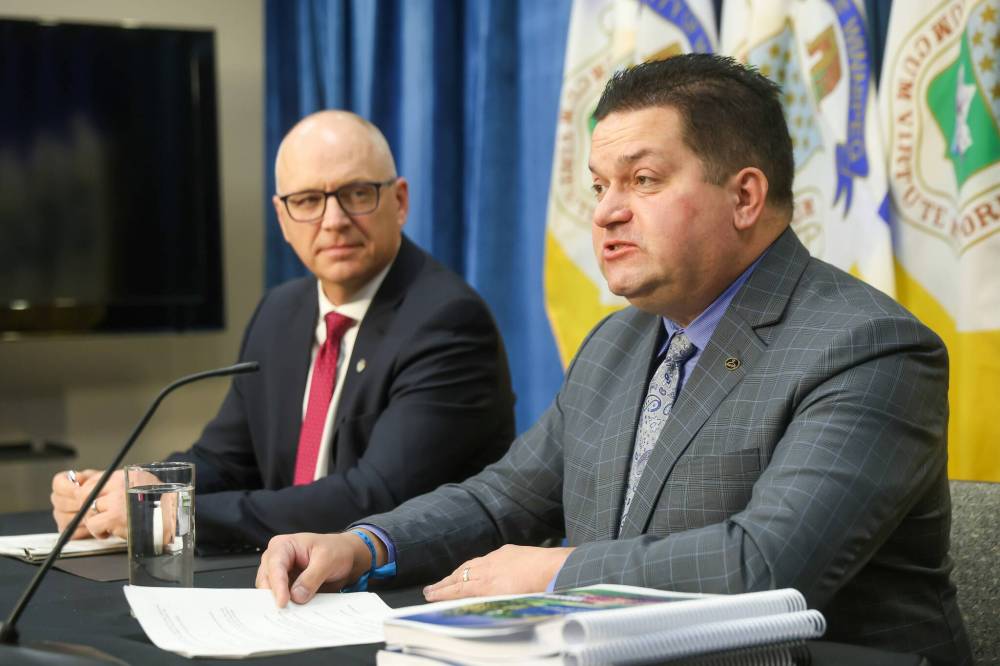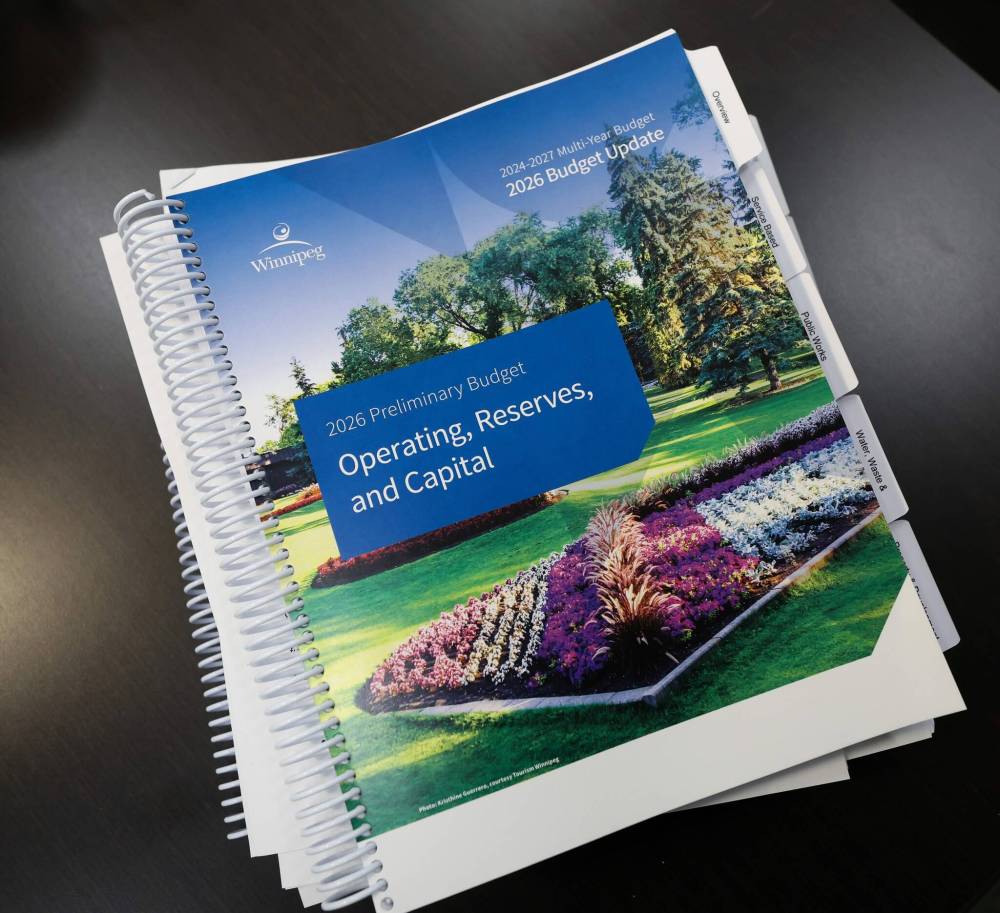City on capital spending spree
Bulk of $1.49-billion budget goes to roads, sewage plant, bridges
Advertisement
Read this article for free:
or
Already have an account? Log in here »
To continue reading, please subscribe:
Monthly Digital Subscription
$0 for the first 4 weeks*
- Enjoy unlimited reading on winnipegfreepress.com
- Read the E-Edition, our digital replica newspaper
- Access News Break, our award-winning app
- Play interactive puzzles
*No charge for 4 weeks then price increases to the regular rate of $19.00 plus GST every four weeks. Offer available to new and qualified returning subscribers only. Cancel any time.
Monthly Digital Subscription
$4.75/week*
- Enjoy unlimited reading on winnipegfreepress.com
- Read the E-Edition, our digital replica newspaper
- Access News Break, our award-winning app
- Play interactive puzzles
*Billed as $19 plus GST every four weeks. Cancel any time.
To continue reading, please subscribe:
Add Free Press access to your Brandon Sun subscription for only an additional
$1 for the first 4 weeks*
*Your next subscription payment will increase by $1.00 and you will be charged $16.99 plus GST for four weeks. After four weeks, your payment will increase to $23.99 plus GST every four weeks.
Read unlimited articles for free today:
or
Already have an account? Log in here »
The City of Winnipeg’s 2026 budget proposes a major capital spending plan and hiring new staff to reduce the strain on some emergency services.
The overall $1.49-billion preliminary operating budget also proposes a 3.5 per cent property tax hike, which would equate to a $75 increase for a sample home valued at $371,000.
The budget features a sharp surge in capital spending this year to $1.19 billion, up from $677 million in 2025.

MIKE DEAL / FREE PRESS
Winnipeg Mayor Scott Gillingham and Jeff Browaty, Chair, Standing Policy Committee on Finance, talk to the media about the 2026 Preliminary Budget.
A large portion of that would cover one-third of the $1.5-billion third and final phase of the North End sewage treatment plant upgrade, a nutrient removal facility set to greatly reduce pollution flowing out of the plant.
As the city previously noted, it will take on $547 million of long-term debt to pay its share of that project, while it seeks a combined $994 million from the provincial and federal governments to fund the rest.
“(This budget has) generational infrastructure investments, including the largest capital program ever delivered and the largest road renewal plan in our city’s history (over the next six years),” said Mayor Scott Gillingham.
The six-year, $3.8-billion capital forecast includes $1.1 billion for regional and local roads, though the full spending would depend on multiple future budget approvals.
If future votes don’t alter the plan, the city will also add $239 million for new Winnipeg Transit buses during that time.
Gillingham noted the city would have much more funding available for other capital projects if the $3.1-billion North End sewage treatment plant upgrade had been funded years ago, when it was expected to cost $795 million.
“It would make billions of dollars of difference,” he said.
Civic staff will conduct a review of the municipal government’s debt strategy, since new spending will take the city to its debt ceiling.
The operating budget also proposes some notable additions to civic staff.
Proposed hires include 40 more full-time firefighter positions over the next four years, at a rate of 10 per year, to create a fully trained team working in rotation covering absences — such as those created by illness and vacations — to reduce the need for overtime and boost response capacity.
“The reality is, with what firefighters are dealing with on the street… with people in various mental-health crises, the job has changed and the absences are higher,” said Coun. Jeff Browaty, the city’s finance chairman.
The city would also add nine positions to create a Winnipeg Fire Paramedic Service wellness clinic, and the province has promised to fund 11.5 new Winnipeg paramedic positions.
Browaty (North Kildonan) noted soaring overtime and shift absences have been a concern since the pandemic and haven’t returned to normal levels since.
“The staffing ratio hasn’t really kept up,” he said.
On Monday city council’s finance committee approved a $3-million overrun for the WFPS 2025 budget, which was blamed largely on high overtime and Workers Compensation Board costs. WFPS overtime costs are currently expected to come in nearly $7 million over budget this year, which will be offset by savings, revenues and provincial funding.
The union that represents Winnipeg firefighters said the announcement was a major disappointment, and won’t take much pressure off his members.
“Those 10 positions (per year) will be gobbled up by retirements and/or injuries going forward,” said TJ Belluk, vice-president of the United Fire Fighters of Winnipeg. “We already have some of the slowest response times in Canada and this is not going to help that.”
UFFW had asked the city to add 80 full-time, regularly scheduled firefighters to reduce overtime this year.

MIKE DEAL / FREE PRESS
City council will cast its final budget vote on Dec. 17.
“We’re still going to be short-staffed (with the city’s plan)…. The overtime is not going to have moved on the needle at all,” said Belluk.
Other staffing increases in the proposed budget include 17 more positions for neighbourhood action teams that are cross-trained to deliver a variety of city services, such as mowing grass, plowing snow and patching potholes.
Another three full-time positions would be created for the water and waste utility billing centre in an effort to reduce frustrating phone queues that have left some callers on hold for hours.
“Time to invest (in) more people to answer those calls, reduce the wait times, provide better customer service to the people of Winnipeg,” Gillingham said.
Revenue from one percentage point of the 3.5 per cent property tax hike would be dedicated to local and regional roads, sidewalks and bridges, along with pedestrian and cycling paths, tree replacement and preservation.
The remaining 2.5 percentage points would be devoted to the tax-supported operating budget, including transferring earnings from 0.33 percentage points to the Winnipeg Transit infrastructure reserve.
A 5.95 per cent property tax hike was imposed in 2025, which marked the city’s highest one-year increase since the 1990s. The same year, the annual per-home garbage fee rose to $254 from $93, while the typical home’s sewer rate increased by $168.
The mayor maintains those taxes and fees were necessary to balance the budget without cutting critical services.
Meanwhile, the budget confirms that a previously delayed 911 fee of $1 per month, which the city wanted to add to all cellphone and landline bills registered to Winnipeg addresses, has now been ruled out for 2026. Originally proposed in 2024, it was meant to help fund “next generation” 911 service. The city is now looking for other funding options.
Earlier Friday, the city noted Moody’s has confirmed that the municipal government will maintain its Aa2 (stable) credit rating. In general, a lower credit rating means higher interest rates on government loans.
A series of public meetings will be held for city committees to debate the financial plan and hear feedback over the next few weeks, possibly triggering changes.
City council will cast its final budget vote on Dec. 17.
joyanne.pursaga@freepress.mb.ca
X: @joyanne_pursaga

Joyanne is city hall reporter for the Winnipeg Free Press. A reporter since 2004, she began covering politics exclusively in 2012, writing on city hall and the Manitoba Legislature for the Winnipeg Sun before joining the Free Press in early 2020. Read more about Joyanne.
Every piece of reporting Joyanne produces is reviewed by an editing team before it is posted online or published in print — part of the Free Press‘s tradition, since 1872, of producing reliable independent journalism. Read more about Free Press’s history and mandate, and learn how our newsroom operates.
Our newsroom depends on a growing audience of readers to power our journalism. If you are not a paid reader, please consider becoming a subscriber.
Our newsroom depends on its audience of readers to power our journalism. Thank you for your support.
History
Updated on Friday, November 14, 2025 6:57 PM CST: Updates with final version






